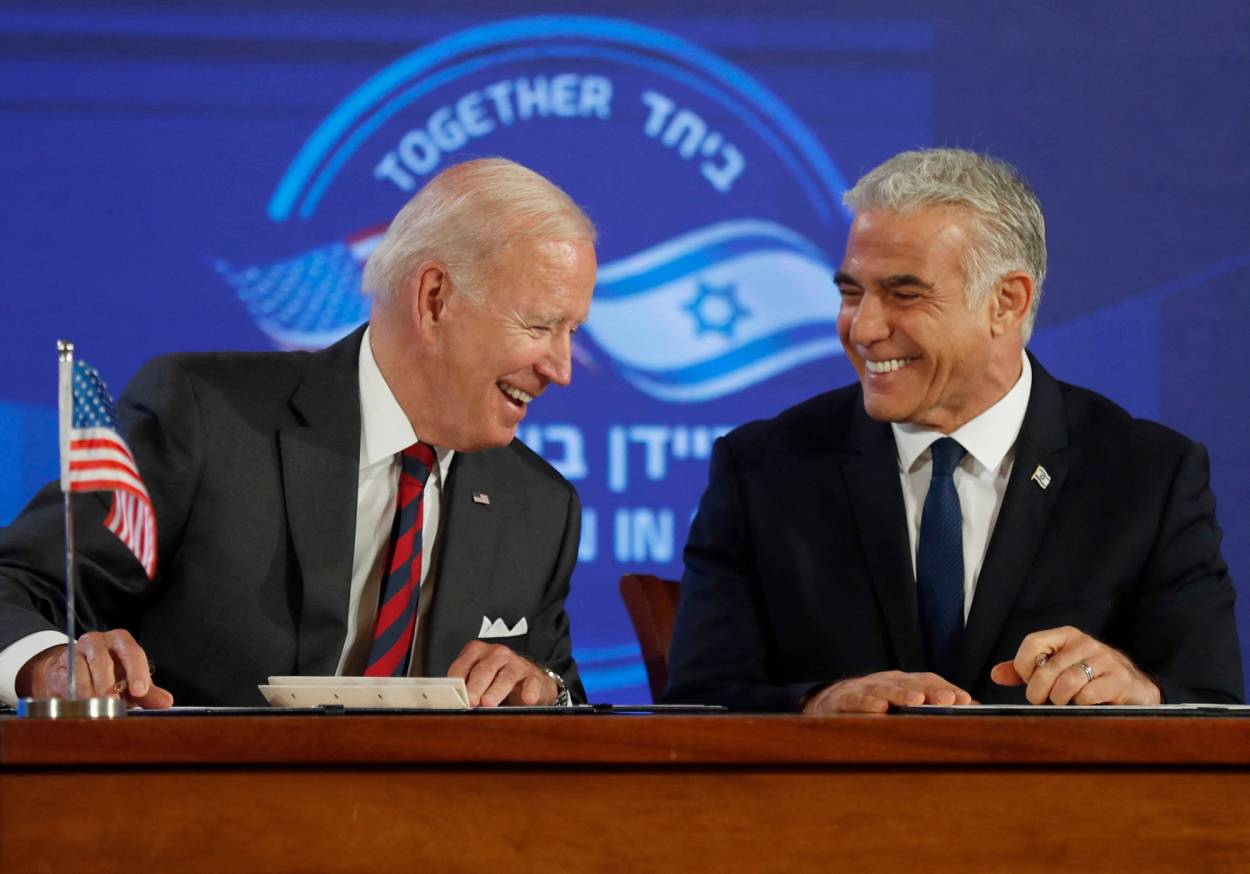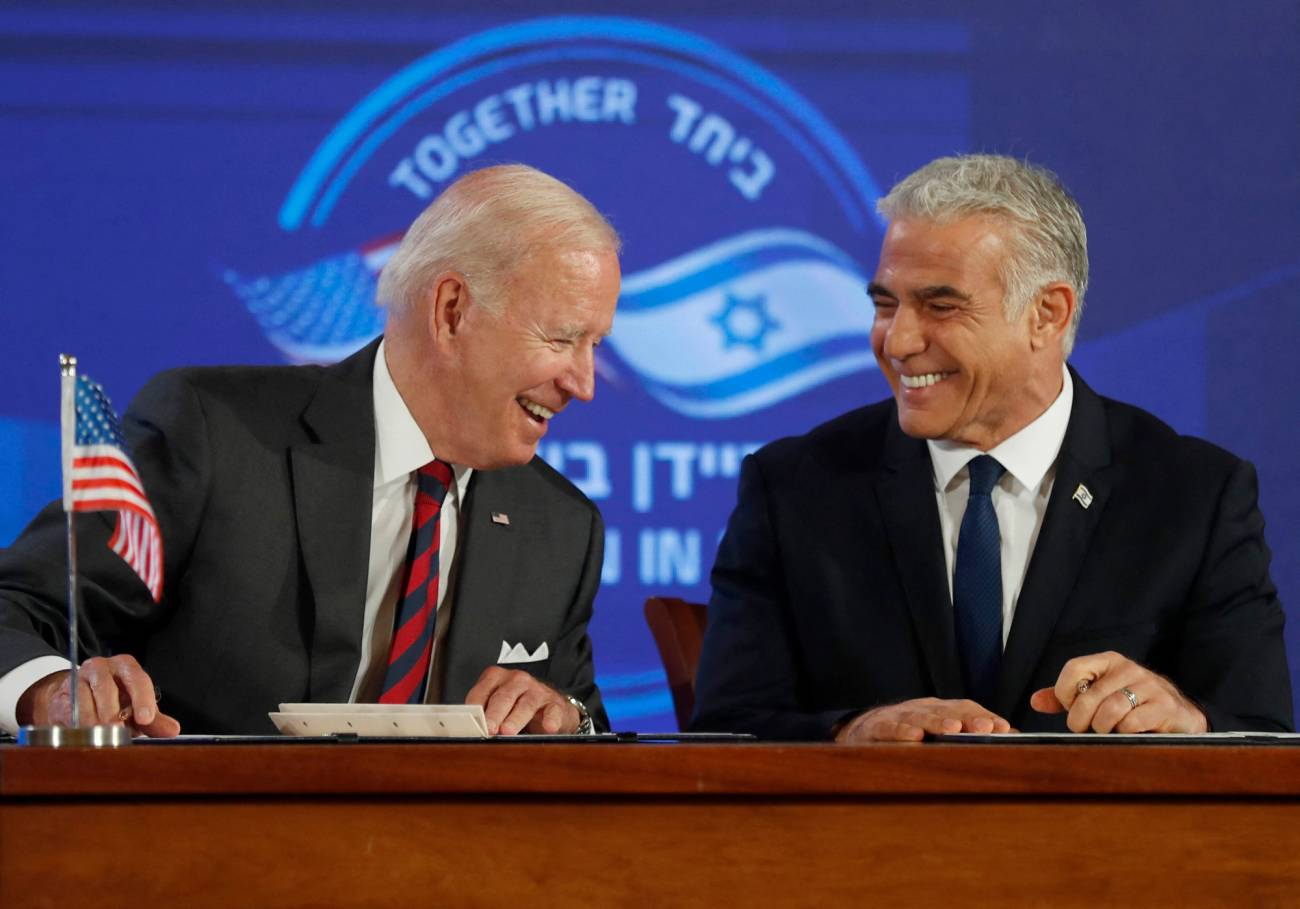Yeah, Buoy!!!
Yair Lapid trades Mediterranean gas fields claimed by Israel to Hezbollah in exchange for a line of rusting buoys




The citizens of the State of Israel were informed last week that the caretaker government of Prime Minister Yair Lapid was about to trade several hundred square miles of their potentially resource rich exclusive economic zone for what he said would be a form of “international recognition” of a line of underrecognized buoys. This “recognition,” Lapid stressed, is the key achievement that would make the deal worth it all, including Israel relinquishing the entire maritime territory in dispute.
But within days, things seemed to have hit a wall as Lapid’s big buoy accomplishment was predictably put on ice by the Lebanese, who sent back to the U.S. mediator a list of amendments to his proposal. Lapid, facing strong domestic criticism weeks before the elections, promptly announced his rejection of the Lebanese amendments. However, the Israeli government made sure to telegraph—including in Arabic through one of its surrogates—its desire to conclude the deal, especially as the Biden administration also publicized its commitment to see the deal through and sent out public messages to the Israelis to simmer down. For their part, the Lebanese downplayed the importance of the hoopla and sounded upbeat that Washington will still come through for them. On Sunday, Beirut announced that the U.S. mediator was to relay an updated proposal within hours. On Tuesday, it was announced that a deal had been reached.
The explanation for this strange, somewhat confusing conclusion to one of the region’s less urgent-seeming negotiations is found in America’s newfound role as champion of the Hezbollah-run pseudo-state that is sometimes known as Lebanon. The Biden administration described concluding the deal as a “key priority,” and President Biden personally impressed upon Lapid at the end of August the need to conclude the deal within weeks.
In pushing the deal on the Israelis, the U.S. administration saw an opportunity to obtain major concessions from a weak caretaker government that might in turn help to advance the Biden team’s wobbly regional agenda of realigning the United States with Iran. How far the administration pushed, and how much the Lapid government was willing to bend, became clearer as details about the deal were leaked to the Lebanese media. Israelis were shocked to learn that Lapid’s government was agreeing to cede the entire area in dispute to the Lebanese side. It didn’t take long for former Prime Minister Benjamin Netanyahu to level the charge at his rival: “Yair Lapid shamefully surrendered to [Hezbollah leader Hassan] Nasrallah’s threats.”
Netanyahu’s former energy minister, Yuval Steinitz, who briefly partook in negotiations on the maritime border when the Trump administration made its own ill-advised attempt to revive this track in 2020, likewise described the deal as “by definition a surrender to blackmail.” Steinitz added that the ratio of the deal ended up being 100-0 in Lebanon’s favor.
The Israeli press meanwhile was torn between wonderment at the apparent awfulness of the deal and the horror of agreeing with Netanyahu, who, after all, is the real enemy of Israel’s chattering classes—and, worse, might now ride the Lebanon gas deal back to the premiership in November. Despite their in-group hatred of Bibi, some Israeli national security reporters could not help but echo Netanyahu’s characterization and ask incredulously: Could it really be that the government had simply folded in the face of Hezbollah’s threats to target Israel’s energy infrastructure if the group didn’t get what it wanted?
For others, the choice was clear: The government’s deal had to be hyped up in order to keep Bibi down. “The great majority of the Israeli press is infected with the local version of Never-Trumpism: Never-Bibism,” says Israeli writer and historian Gadi Taub. “And so they are protecting Lapid, almost at any cost.”
It’s a win-win, right? You actually get to keep your own house, while giving away only part of your yard!
The first step in the campaign to promote the self-evident wonders of the Lebanon gas deal to lying Israeli eyes was to be wildly dishonest about the disputed area under discussion. An unnamed official who briefed the press on background denied that Israel had completely caved to Lebanon’s demands, “pointing to the fact that Beirut had demanded that Line 29 further south be the border. This would have given Lebanon parts of the Karish gas field.”
The reference to Line 29 is an obvious red herring, though—since the Lebanese border line, Line 23, is the only one Lebanon has registered with the United Nations. Raising the semifictitious “Line 29” was simply a passing Lebanese negotiating tactic to get everything up to Line 23. Pretending that anyone took Lebanese posturing about “Line 29” seriously was an attempt to make Israel’s surrender look less complete.
Accordingly, amplifiers in the Israeli press have been pushing the falsehood that in proposing Israel concede Line 23, the Biden administration’s envoy was offering a “compromise.” See, Team Biden didn’t take the Lapid government to the cleaners on Hezbollah’s behalf. The Israelis get to keep Karish—a gas field that was always theirs and never part of the disputed area in the first place. It’s a win-win, right? You actually get to keep your own house, while giving away only part of your yard!
In addition to this nonsense, Israeli government officials tossed out a bunch of similarly incoherent talking points that ranged from the pretense of profound altruism toward the suffering people of Lebanon to pseudo-realist arguments about regional stability that involved bizarre redefinitions of deterrence. Of these, the Lapid government seemed most satisfied with spin about how the deal actually weakened Hezbollah. “We want to weaken Hezbollah’s influence in Lebanon. That is why we are trying to advance the negotiations on the maritime border,” said national security adviser Eyal Hulata last month, explaining why Hezbollah would now be granted its own gas rig in the Mediterranean, in de facto partnership with the French oil giant Total. When Lapid announced receiving the U.S. proposal for the deal, he repeated the fake, tough-seeming mantra that the deal would “weaken Hezbollah.”
Faced with criticism and ridicule, the government and its surrogates were forced to get more specific about the great negotiating victory they had supposedly won. Hence, the messaging hyped as a major win the inclusion of a small buffer zone near the shore at Naqoura that extends some 5 kilometers out to sea before it ties back to Line 23, which Israel had agreed to concede to Lebanon. The buffer area is marked by a line of old buoys that Israel had placed in the water after its withdrawal from Lebanon.
The government’s new pitch was that this would be the real benefit of the deal: preserving and enhancing Israel’s security interests through the now-famous buoy line. Barak Ravid, the local Israeli journalistic mouthpiece of the Obama-Biden policy team from the Iran deal days, relayed that government officials who briefed reporters on the deal said that anchoring the “line of buoys” was “very important” because “in the last 20 years the Israeli military operated along this line unilaterally and the Lebanese side had international legitimacy to challenge it.” The deal, however, “will allow Israel to treat it as its northern territorial border.”
In other words, in the two decades up to this moment, Israel has had total freedom to operate in the area to ensure its security against Hezbollah. However, without the deal, the terror pseudo-state to its north would suddenly have enjoyed “international legitimacy” to challenge Israel. That sounds very serious—and certainly warrants ceding territory with potential energy resources under threat of force to a terrorist group that is stockpiling and pointing tens of thousands of rockets at you.
Needless to say, the Lebanese side disagrees with the Israeli reading. Instead, it claims another point on land farther south at Naqoura. Squaring this circle, probably with some creative language, is what the U.S. mediator likely has been busy figuring out.
Meanwhile, Israeli Defense Minister Benny Gantz was spit-balling another set of talkers: “This is an agreement whose essence is economic,” Gantz said last week. “And if it is signed, we, as well as Lebanon and its citizens, who are suffering from a severe crisis, will enjoy it for years to come.” The logic here was that if Lebanon gets its rig in its Block 9 opposite Israel’s rig at Karish, then Hezbollah will have a stake in maintaining calm and smooth operation of both rigs. So, in the future, if Hezbollah attacks Israeli energy infrastructure, Israel can target a gas rig owned and operated by France’s Total—putting France on Hezbollah’s side.
This pretense of hard security and pseudo-deterrence posture rang even more hollow as it clashed with another key government talker: that Israel had to conclude this awful deal ASAP if it wanted to avoid a new war with Hezbollah. An IDF official sent out to make this pitch put it this way: “There is an urgency and a necessity to reach an agreement in the near future and without delay, in order to prevent an escalation of security [dangers], which is [otherwise] highly likely, and to utilize the unique window of opportunity to reach an agreement.”
The logic here was itself unique in the annals of deterrence: If your psychopathic neighbor keeps slashing the tires on your shiny Mercedes, the solution is to buy him a spanking brand-new Mercedes of his own that you can then pretend to hold hostage.
The source of this weird pitch was again the Biden administration. As a senior U.S. administration official relayed through Ravid, the reason Biden wanted Lapid to wrap up the deal within weeks was “because the issue has become urgent and the lack of an agreement could lead to dangerous consequences for the region.”
Yet when U.S. Sen. Ted Cruz tweeted that he was troubled by how the Biden administration “pressured our Israeli allies” into a comically terrible deal, the Washington arm of the Obama-Biden messaging machine sprang into action. The progressive lobbying group J Street put out a brief that “fact checked” Sen. Cruz’s ignorant partisanship. Daniel Shapiro, Obama’s former ambassador to Israel who is intimately familiar with the communications environment in Israel, weighed in, regurgitating the same exact talkers and asserting that it was “definitely NOT” American pressure that pushed Israel into this deal.
Yet the reason the Biden administration announced that a gas deal was a key priority was precisely because it’s a deal with Hezbollah. Stabilizing and investing in Iranian regional “equities” is at the core of the Obama-Biden doctrine of realignment with Iran. It’s how you achieve “regional integration”—by publicly showcasing your ability to pressure your allies to prop up Iranian assets, even as the Iranian people are being mowed down in the streets.
Tony Badran is Tablet’s news editor and Levant analyst.